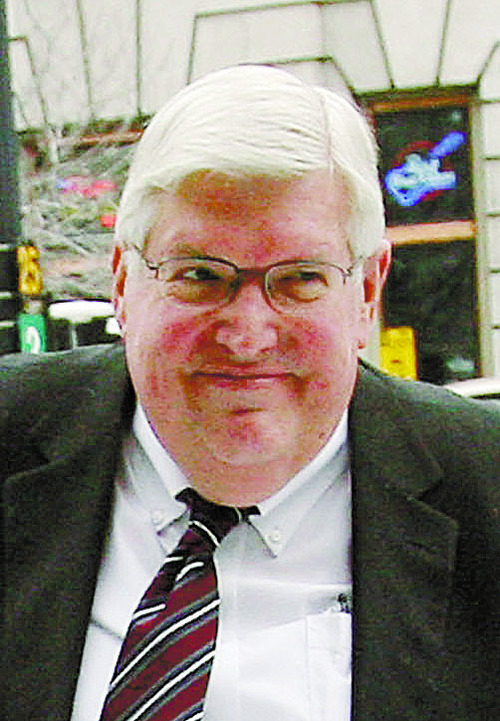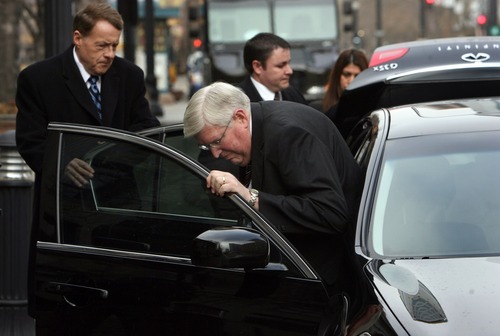This is an archived article that was published on sltrib.com in 2012, and information in the article may be outdated. It is provided only for personal research purposes and may not be reprinted.
Editor's note: Dewey C. MacKay began his 20-year sentence at a federal prison on Tuesday. This story originally reported MacKay entered the prison Monday. MacKay had been scheduled to report Monday, but was granted an extra day in a motion that was sealed by a judge and unavailable to the public.
A Brigham City doctor convicted in September of illegally distributing painkillers arrived at a California prison Tuesday to start serving a 20-year prison term.
Dewey C. MacKay III, 64, will serve time at the Federal Correctional Institution in Terminal Island, Calif., a low-security facility that houses 1,140 male inmates near Los Angeles Harbor, his attorney Peter Stirba said recently.
MacKay's incarceration comes after seven months of legal wrangling in which Stirba has tried to keep him out of prison while appealing the convictions.
U.S. District Judge Dee Benson in March ordered MacKay to report to prison by noon Monday, after attorneys on both sides of the case fought over when MacKay should have been required to self-surrender.
In a motion filed in February, Assistant U.S. Attorney Michael Kennedy requested that Benson order MacKay to self-surrender to prison by the April 2. Kennedy's request came after a ruling from the 10th Circuit Court of Appeals in Denver, which denied a request from MacKay to stay out of prison while he appeals his case. The appeals court ruled that MacKay failed to show "exceptional reasons" that he should be allowed to stay out of prison pending his appeals.
Benson had denied a request to allow MacKay to stay out of prison while his attorneys appeal, but did grant a defense request to allow MacKay to remain free while appealing Benson's ruling regarding the overall appeal.
Stirba then filed an appeal to the 10th Circuit Court.
MacKay initially was supposed to report to prison Feb. 1.
Stirba had asked Benson to allow MacKay to report to prison on June 22.
Benson decided on the April 30 date, which allowed the Federal Bureau of Prison time to designate MacKay's prison facility.
MacKay was indicted in August 2010 on charges related to prescribing more than 1.9 million hydrocodone pills and nearly 1.6 million oxycodone pills between June 1, 2005, and Oct. 30, 2009. On the evening before the start of jury selection in MacKay's trial in August, prosecutors filed a motion to dismiss a third of MacKay's charges, saying the case could be tried more effectively without the additional charges.
At trial, prosecutors argued that MacKay did not conduct physical exams or question patients to determine whether they were abusing or selling the drugs, despite cases in which a patient's family member called to report prescription abuse.
MacKay was accused of pushing 80 to 120 patients through his office in an eight-hour workday, spending just minutes with each person. The Drug Enforcement Administration revoked MacKay's authorization to prescribe controlled substances after completing an investigation that led to his indictment.
Jurors convicted MacKay on Sept. 26 on 40 counts related to illegally distributing painkillers. They also found MacKay guilty of two counts of distribution of a controlled substance resulting in death, three counts of use of a communication facility in a drug trafficking offense, and 35 counts of distribution of a controlled substance. The doctor was acquitted on 44 other distribution counts.
Benson reluctantly sentenced MacKay in December to a mandatory minimum sentence of 20 years in prison. At a January hearing, Benson accused prosecutors of vindictiveness and has made various other sympathetic comments toward MacKay and MacKay's family during court proceedings.
Several prominent Utahns wrote letters to Benson on behalf of MacKay before the sentencing, including Rep. Rob Bishop, R-Utah, and Utah State Senate Majority Assistant Whip Peter Knudson, R-Brigham City.
Among the counts MacKay was convicted of was causing the death of 55-year-old David Leslie Wirick in 2006. Wirick, a rocket scientist at Alliant Techsystems, died of a drug overdose during a three-day binge after filling prescriptions from MacKay.
MacKay's defense attorneys continue to work on appeals in his case.
Twitter: @mrogers_trib





